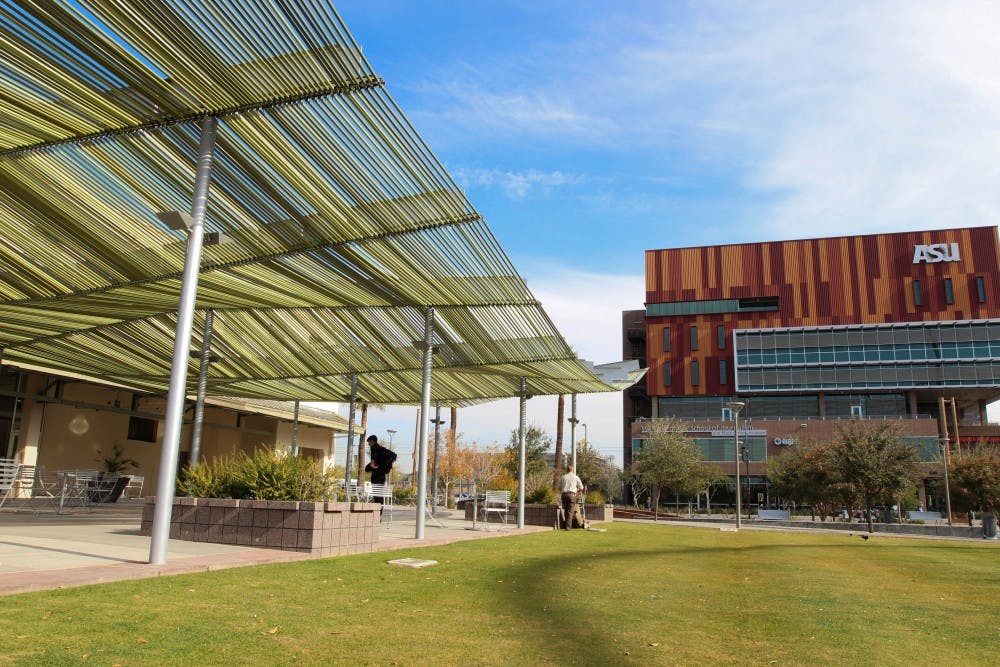 A view of ASU's Downtown Campus, a rapidly growing satellite of ASU Tempe. Even though tuition at ASU has gone up, the increases are comparable across the geographic region, and the University has balanced the effect by continuing to allow ASU to grow. (Photo by Dominic Valente.)
A view of ASU's Downtown Campus, a rapidly growing satellite of ASU Tempe. Even though tuition at ASU has gone up, the increases are comparable across the geographic region, and the University has balanced the effect by continuing to allow ASU to grow. (Photo by Dominic Valente.)Despite a number of well-documented tuition hikes, a recent study has named ASU a model for national reform because it leads the way in lowering educational costs and increasing access to higher education.
The study, titled "The Next Generation University," was conducted by the New America Foundation, a non-profit, non-partisan think tank whose website says the report "comes at a time when too many public universities are failing to respond to the nation’s higher education crisis."
NAF education policy program policy analyst Rachel Fishman said six universities were chosen based on the innovative policies they employ to serve their student populations.
"We found that ASU is using a lot of technology-enhanced education because the University is getting so big," she said. "They excel at providing education at scale to 60 or 70 thousand students, while making sure their graduation rates stay high."
Fishman said ASU is unique in that it employs student analytics to help students figure out which classes they should take and how to pair hybrid, online and face-to-face classes without having to hire extra administration.
Information specialist Natasha Karaczan said in an email that ASU is focused on being a national innovator in curriculum design to improve student learning and accelerate pathways to graduation.
"At ASU, we are committed to academic excellence and measure our success by who we include and how they succeed," she said.
Even though tuition at ASU has gone up, Fishman said the increases are comparable across the geographic region, and the University has balanced the effect by continuing to allow ASU to grow.
"In other states, tuition fees are going up, and enrollment is restricted," she said, "so many students are getting squeezed out because it costs more, and there aren't as many slots open to them."
Fishman said the report aims to commend universities that are more inclusive than exclusive because education correlates strongly with income and such policies are "in the country's best interest."
She said public universities serve more than 70 percent of all students in higher education, and it is not a good idea for universities to become more exclusive.
"Most of the people going to Harvard are already from very wealthy backgrounds, so they are not looking to really scale their education in ways that public universities should," she said. "If we are telling young people that higher education is increasingly important, we don't want to crowd them out."
Shannon Maule, president of the Higher Education Student Association, said studies like the one done by the New America Foundation are important because higher education is constantly changing and evolving.
"The fact that ASU was included in this study goes to show that the University is ready and willing to make the changes necessary to provide updated forms of higher education to all of the population," she said.
Maule, a masters of education student, said allowing students to learn in whatever capacity they can, be it face-to-face or online, will be beneficial to the job market, because it will allow people multiple ways to pursue professional degrees and provide a more educated workforce.
"Every person has to pursue education in their own way, and the goal at ASU seems to be to expand learning opportunities and possibilities for everyone," she said. "Making sure people realize that learning is different for everyone and will yield success in any field is the ultimate point."
Reach the reporter at npmendo@asu.edu or follow him on Twitter @NPMendoza




